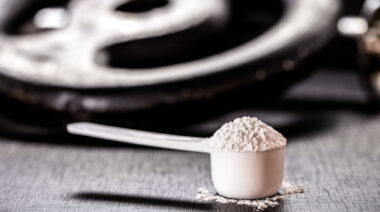Nutrient timing is by far one of the most discussed aspects of nutrition for athletics. I would say I am asked about thewhen of nutrients nearly as often as the what, and creatine is no exception to this rule. As one of the best supplements out there, it’s generally understood that we should be taking it, but we don’t always know when.
Many nutritionists make a big stink about nutrient timing. Although timing is important, knowing what to eat and how much are both more important than when. But for athletes who want to be competitive at the highest levels, every little detail counts. In a recent study in the Journal of the International Society of Sports Nutrition, researchers wanted to find out if timing your creatine intake actually makes a difference.
The study design was quite simple. The researchers used a fairly standard dose of 5 grams of creatine on a group of lifters. The participants engaged in a bodybuilding-style program for four weeks. Their stats were measured before and after their workouts and they ate normal, high-protein diets with a good mix of macronutrients. Each participant was assigned to one of two groups. The first group took creatine immediately before exercise, and the other group took it immediately after.
There was a difference between the groups, although it was small. Ultimately, the post-workout group experienced the greatest trends towards superior gains in both lean mass and strength. Keep in mind, however, that this study only went on for four weeks. That’s enough time to see a small difference in anyone lifting regularly, with or without creatine, but not necessarily long enough to see a huge difference.
There are a few other factors to consider as well. It’s possible the small sample size drove the result and that creatine had nothing to do with it. More research using bigger samples would be needed in order to be certain. But let’s assume that the results are true, just to see if it makes any sense. Why would timing your creatine intake make a difference?
Dietary creatine could have something to do with it. Indeed, around 20% of participants were non-responders to creatine, which could be simply because of their high-protein diets. Perhaps they had enough creatine in their muscle already before their workout. However, this wouldn’t explain the difference in timing per se, since the total daily creatine intake would be the same.
It’s also possible that creatine absorption increases after a workout, much like protein absorption and glucose sensitivity. While this contention is somewhat disputed for nutrients in general, it could be a viable reason why creatine might be better utilized right after a workout.
Ultimately, we don’t totally know. This topic needs to be addressed with a bigger and better study. For now, it seems like adding creatine into your post-workout meal or shake will either be as good or potentially better than any other time.
References:
1. Jose Antonio, et. al., “The effects of pre versus post workout supplementation of creatine monohydrate on body composition and strength,” Journal of the International Society of Sports Nutrition 2013, 10:36.
Photo courtesy of Shutterstock.






